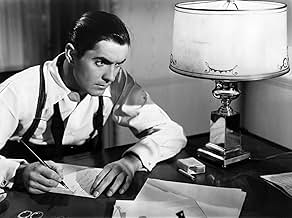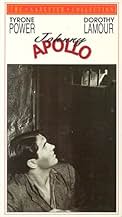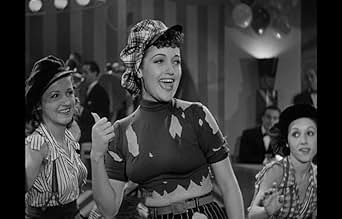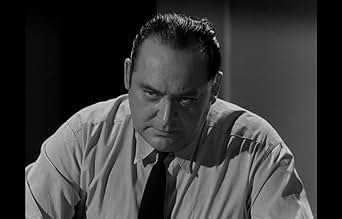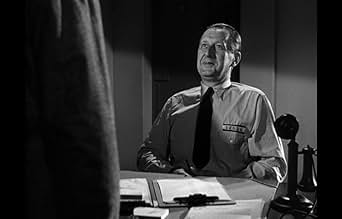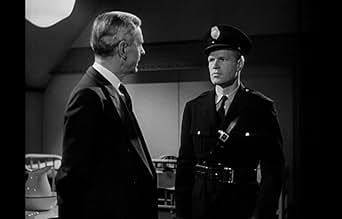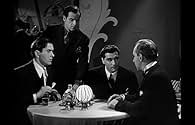Bob est devenu Johnny Appolo, un truand. Sa déviance dans le crime est lié au fait que son père a été arrêté. Lui-même arrêté, il retrouve son père sous les habits d'un gardien de prison.Bob est devenu Johnny Appolo, un truand. Sa déviance dans le crime est lié au fait que son père a été arrêté. Lui-même arrêté, il retrouve son père sous les habits d'un gardien de prison.Bob est devenu Johnny Appolo, un truand. Sa déviance dans le crime est lié au fait que son père a été arrêté. Lui-même arrêté, il retrouve son père sous les habits d'un gardien de prison.
- Réalisation
- Scénario
- Casting principal
- Récompenses
- 2 victoires au total
- Warden
- (as Selmar Jackson)
- Announcer
- (voix)
Avis à la une
This story is too loosely plotted, but not in a way that makes it difficult to follow...
Helping immensely is that the film is great looking, and directed exceptionally by Henry Hathaway. The black-and-white cinematography is especially noteworthy; photographer Arthur Miller might have received his annual "Academy Award" nomination for this one, if the studio wasn't backing him in "The Blue Bird" (1940). Then Fox' biggest star, Power shows he might have accomplished the same feat at MGM or Warner Bros. Singing and "Dancing for Nickels and Dimes", Ms. Lamour is luscious, especially in a leggy skirt and clinging top. Dependable supporting actors like Mr. Nolan and Mr. Grapewin get juicy parts, too.
******* Johnny Apollo (3/15/40) Henry Hathaway ~ Tyrone Power, Dorothy Lamour, Lloyd Nolan, Edward Arnold
Lloyd Nolan plays a low-key gangster and Tyrone Power plays a guy who exhibits good and bad. Dorothy Lamour, Edward Arnold, Charley Grapewin and Lionel Atwill all add to this talented cast. Lamour's tough-talking "dame" character and good cinematography helped this movie be characterized as a very early entry into the film noir genre.
The problem with the movie was the believability of the story. There were too many unanswered questions in here. Why was this person arrested? How and why could this happen, and that? There are lots of holes in here and sometimes they were so prevalent they broke up the continuity of the story.
Okay for one curious look but not worth a purchase, although it's still not available on DVD anyway, and few people buy new VHS tapes anymore.
One fascinating performance is offered by the underused Charlie Grapewin, perhaps known to the average film goer as Uncle Henry in The Wizard of Oz, or as Grandpa in Grapes of Wrath (Grapewins's most sympathetic and memorable role is as burned-out Jeeter Lester in Jonh Ford's misunderstood Tobacco Road). In Johhny Apollo, Grapewin's take on the burned-out lawyer who takes milk with his Scotch and mumbles Shakespeare when to evade confrontation is both funny and endearing and he becomes a pivotal plot element as the plot thickens.
And thicken it does, with lusty Edward Arnold tossed into jail for embezzlement, and his disowned son, Power, taking up with gangster Lloyd Nolan (always reliable, but here essayed with a nasty undercurrent); much of what Nolan's brutal ganglord does adds a noir element to the film,and a brief scene in a steam bath is right out of Sam Fuller.
Add thug Marc Lawrence from Broadway, Jonathan Hale, reliably a doctor, Fuzzy Knight as a nervous prisoner, and from the Son of Frankenstein, Lionel Atwill, cold and calculating as the lawyer without ethics--until money is dangled his way. The pace never flags, and, except for a short and absurd tagged-on ending that Zanuck probably demanded on behalf of Power fans, the film builds to a dynamic shoot-out in a prison. Not a great classic, but a perfect example of 20th Century Fox machine making a film worth watching.
After Power's initial snit over Dad's letting him down, his attempts to secure him an early parole lead, though `connected' shantoozie Dorothy Lamour, to the underworld. The muscles he developed rowing crew in the Ivy League stand him in good stead as muscle in the mob, for soon he becomes a trusted lieutenant in Lloyd Nolan's crime family (plausibility is not the movie's long suit). But Pop (who has reclaimed his spiritual center in the Big House by welding boilers) disowns his namesake when he learns of his new line of work. In due time, of course, Power ends up behind those bars as well. But that's far from the end of the tale....
The plot of Johnny Apollo, a major production, takes a few turns too many but manages to keep a just-passable amount of credibility. Though Power, in the lead, stays less than persuasive as a menacing mobster he's too much of a pretty-boy, and lacks the acting resources to turn himself into a pretty-boy psychopath the rest of the cast compensates. Predictably, Arnold is good, as is, in the role of a mob mouthpiece with a weakness for Scotch-and-milk, Charlie Grapewin (whose first film credit falls in the last year of the 19th Century!); the two seem to be vying for title of America's sweetheart, old-codger division. Best of all is Lamour, with her sad eyes and fetching pout, who leaves an impression here of a skilled actress, more than she managed in all the Hope-Crosby `Road' pictures put together.
Direction is by Henry Hathaway, an uneven craftsman who nonetheless rose to the occasion for a handful of movies; this can be counted among his stronger efforts, along with The Dark Corner, Kiss of Death, Fourteen Hours and Niagara. But Johnny Apollo cleaves more closely to the crime melodramas of the previous decade than to the unsentimental and ambiguous style soon to come. But, in it, one can nonetheless sense particularly in its heavily shaded photography the birth pangs of film noir, struggling to come into the world.
Le saviez-vous
- AnecdotesIn the scene with Johnny and his father talking in the bedroom, the photo over Johnny's shoulder of his mother, is a picture of Tyrone Power's mother.
- GaffesWhen Mickey comes into the judge's offices after the judge has smashed the two whisky bottles, he comments that the room smells like a brewery. It is more likely that the room would smell like a distillery rather than a brewery and Mickey would be aware of the difference.
- Citations
Prisoner Tom Dugan: I steal an empty slot machine and get 10 years, and this guy steals a million and gets 5. Figure that out, will yuh?
Main Reporter: [Sarcastically] That's why you got the 10 - to figure it out.
- ConnexionsFeatured in Les enquêtes de Remington Steele: Cast in Steele (1984)
- Bandes originalesThis Is the Beginning of the End
(1940)
Written by Mack Gordon
Performed by Dorothy Lamour (uncredited) with Harry Rosenthal (uncredited) at piano
Played as background music often
Meilleurs choix
- How long is Johnny Apollo?Alimenté par Alexa
Détails
- Date de sortie
- Pays d’origine
- Langue
- Aussi connu sous le nom de
- Dance with the Devil
- Lieux de tournage
- Sing Sing Penitentiary - 354 Hunter Street, Ossining, New York, États-Unis(exteriors: prison)
- Société de production
- Voir plus de crédits d'entreprise sur IMDbPro
- Durée
- 1h 34min(94 min)
- Couleur
- Rapport de forme
- 1.37 : 1

